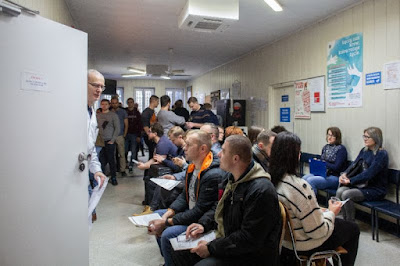Yahoo – AFP,
Robin MILLARD, October 22, 2017
 |
Flowers and candles were placed at a shrine outside Valletta's Palace of Justice
(AFP Photo/Matthew Mirabelli) |
Valletta
(AFP) - Citizens mourning the murder of Daphne Caruana Galizia are calling for
Malta's deeply-ingrained tribal politics to be put aside so the shaken island
nation can begin healing its wounds.
The initial
shock at Monday's car bomb assassination is now turning into demands for a
united front -- with tens of thousands, party allegiance aside, expected at a
national rally on Sunday demanding justice for the journalist.
Caruana
Galizia's anti-corruption blog shone a light into the murky corners of Maltese
politics, rattling the Labour government -- and, more recently, their sworn
enemies in the Nationalist opposition.
On
Saturday, the government offered an award of 1 million euros ($1.2 million) for
information leading to the arrest of those responsible, saying it was
"fully committed to solving the murder" and to "bringing those
responsible to justice".
"As we
are seeing protests develop, we become aware of what has been fought for in
terms of maintaining democracy," said Geraldine Spiteri, one of many
paying her respects to Caruana Galizia at a growing tribute of flowers, candles
and messages in Malta's capital Valletta.
"People
in Malta politicise every issue," the lawyer said, citing the
"deep-rooted tribal mentality, which is very worrying".
"But
certain things go beyond that. I am encouraging people to attend on Sunday to
show the powers that be, on both sides, that people are concerned."
Maltese
politics is split between Prime Minister Joseph Muscat's centre-left Labour
Party, and the centre-right Nationalists.
Family
party loyalty is strong. Come election time, families can expect personal
visits to ensure turnout. With votes pretty much secure, partisan point-scoring
can take priority over upholding the tiny Mediterranean islands' democratic
institutions.
Caruana
Galizia's grisly assassination has added further fuel to the politicians'
tribalist bickering.
'Crocodile tears'
Carmelo
Pace, a retired factory worker, was a self-confessed "avid" reader of
Caruana Galizia's blog.
"I
don't support the government, I support the opposition, but they are just
pointing fingers at each other," the 74-year-old said, adding that
politicians lamenting her loss were shedding "crocodile tears".
Caruana
Galizia, 53, made searing allegations of financial corruption against Muscat's
inner circle, largely based on the Panama Papers leak, forcing him to call a
snap election in June -- which he won comfortably.
She had
recently turned her spotlight on Adrian Delia, the new leader of the
Nationalist Party, which hitherto had sought to capitalise on her allegations.
Kurt
Sansone, online editor of the Malta Today newspaper, said that following her
murder, the country's long-running political divisions now had to be addressed.
"The
polarisation does not help because our institutions need to be beefed up. This
is not a situation that started a few years ago," he told AFP.
"The hope
is now that the police and the magistrate can get to the bottom of this. The
country needs closure in order for us to move forward."
Newspapers
in the European Union's smallest state are running a common front page on
Sunday, under the slogan "the pen conquers fear".
Hours after
they hit the newsstands, the community-organised national demonstration for
justice will march through Valletta's historic streets.
Young
generation unsure
"People
need to go. It's important. If no-one goes, nothing will change," said
Marie, 22, a teaching student.
"Something
is definitely wrong in Malta. If people our age do nothing, that means the
future will be the same. Let's try and think positive."
At the
impromptu memorial to Caruana Galizia, sun-seeking cruise ship tourists
photograph the flowers.
Older
Maltese sit on the shady benches and debate the aftermath, while younger
residents do likewise on their smartphones.
An air of
fatalism has swept around online forums where young people have been discussing
the murder, leaving the next generation unsureabout where Malta goes from here
-- a duty, in a country of only 430,000 people, that will inevitably fall into
their hands.
"Unfortunately,
especially on social media, a lot of people are saying that this is the end of
democracy and freedom of speech," said Robert Napier, president of the
University of Malta students' council, who has been trying to bolster
undergraduates' morale and resolve.
"No
matter how far people are willing to go, nothing should silence our students,
who are ultimately the leaders of tomorrow."
Related Articles:
































